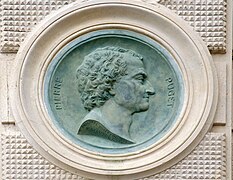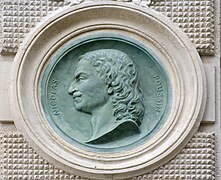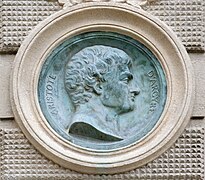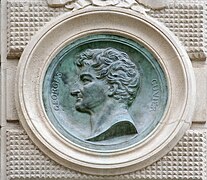Philippe Poitevin
Philippe Poitevin (21 January 1831 in Saint-Maximin-la-Sainte-Baume – 15 September 1907 in Marseille) was a French sculptor.
Biography[]
Philippe Poitevin was a student of Joseph-Marius Ramus and Armand Toussaint.[1] He began at the Salon of 1855 and produced mainly busts.
In 1854, he was hired to restore the friezes of the Palais des Tuileries in Paris. In 1856, he was hired to make 85 stone sculptures for the Lesdiguières Pavilion in the Louvre Palace.[2] After a ten-year stay in Paris, he settled in Marseille.
He worked for the Palais Longchamp in Marseille where, in the main staircase of the Museum of Fine Arts, he produced two groups of two children carrying cartridges on which are engraved the names of artists Finssonius (Louis Finson) and Dandré-Bardon (Michel-François Dandré-Bardon),[3] as well as four bronze medallions, on either side of the museum entrance doors, representing Georges Cuvier and Aristotle for the door of the natural history museum, Nicolas Poussin and Pierre Puget for that of the museum the fine Arts.
For the Longchamp Palace nymphaeum, he produced the bust of Maximin-Dominique Consolat[4] which faces that of the engineer Jean François Mayor de Montricher, sculpted by André-Joseph Allar.
Philippe Poitevin also adorns the facade of the with the bust of Sesostris to represent the art of ancient Egypt, and that of Leo X to represent the Italian Renaissance.
Public collections[]
Gallery[]
- Œuvres de Philippe Poitevin

Pierre Puget, Marseille, Palais Longchamp

Nicolas Poussin, Marseille, Palais Longchamp

Aristote, Marseille, Palais Longchamp

Georges Cuvier, Marseille, Palais Longchamp

Sesostris, Palais des Arts - Marseille
Leo X, Palais des Arts - Marseille
Bibliography[]
- Noet, Laurent. "Philippe Poitevin". Marseille, ville sculptée 2..
- Alauzen, André; Noet, Laurent (2006). Dictionnaire des peintres et sculpteurs de Provence-Alpes-Côte d'Azur. Marseille: Jeanne Laffitte. ISBN 9782862764412..
References[]
- ^ "Poitevin, Philippe". Benezit Dictionary of Artists. Oxford University Press. 2011. doi:10.1093/benz/9780199773787.article.B00143773.
- ^ "Philippe Poitevin". Media Antic France. Retrieved 5 October 2020.
- ^ Vial, Marie-Paule (1991). Le palais Longchamp. Marseille: Images en manœuvres éditions. p. 110. ISBN 978-2-908445-05-3.
- ^ Mayor of Marseille who paved the way for the Canal de Marseille
- ^ Base Joconde: Reference no. 000SC004428, French Ministry of Culture. (in French)
- ^ Base Joconde: Reference no. 000SC004429, French Ministry of Culture. (in French)
- ^ Base Joconde: Reference no. 000SC004431, French Ministry of Culture. (in French)
- ^ Base Joconde: Reference no. 000SC005050, French Ministry of Culture. (in French)
- ^ Base Joconde: Reference no. 000SC004430, French Ministry of Culture. (in French)
- 1831 births
- 19th-century births
- 1907 deaths
- 20th-century deaths
- People from Var (department)



